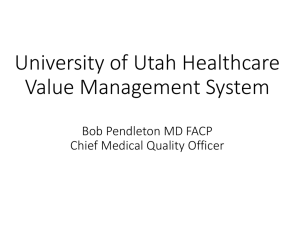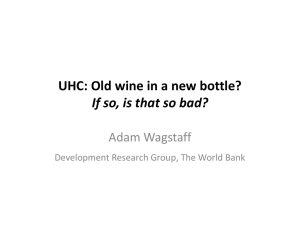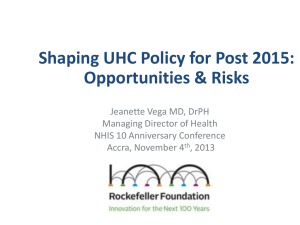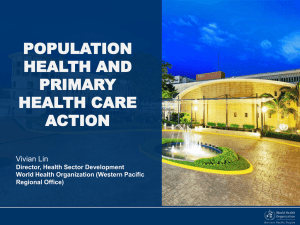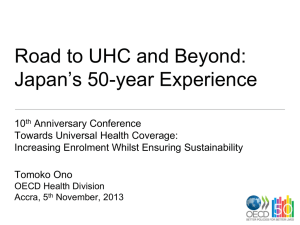Dornsife School of Public Health, Urban Health Collaborative 2016 Pilot Funding
advertisement
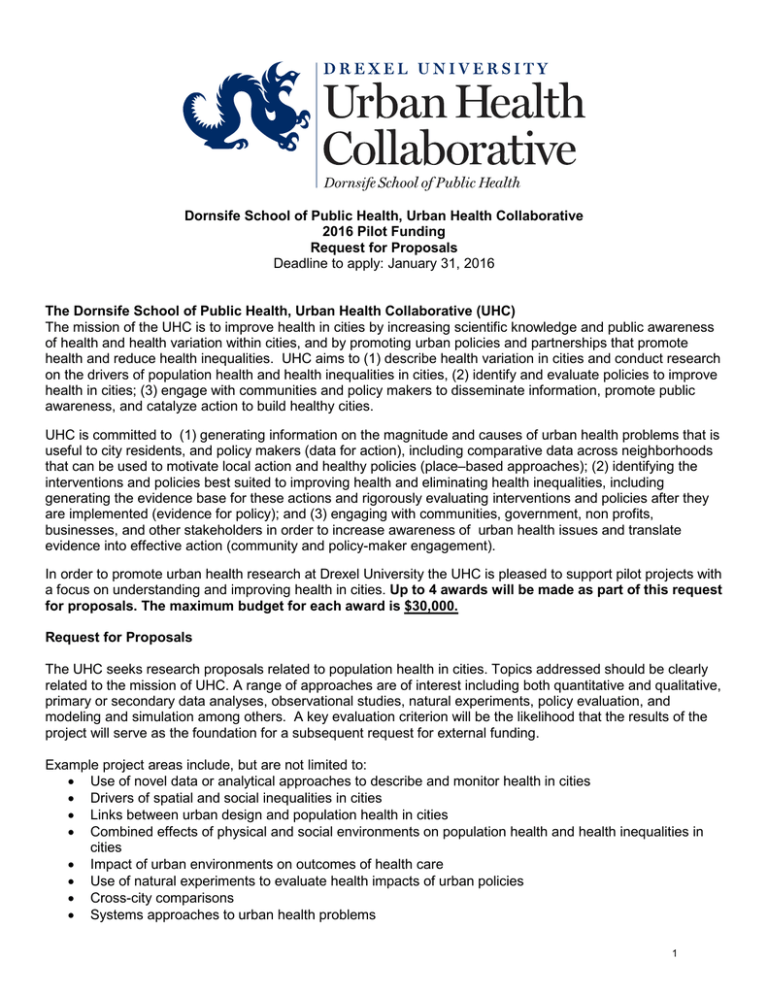
Dornsife School of Public Health, Urban Health Collaborative 2016 Pilot Funding Request for Proposals Deadline to apply: January 31, 2016 The Dornsife School of Public Health, Urban Health Collaborative (UHC) The mission of the UHC is to improve health in cities by increasing scientific knowledge and public awareness of health and health variation within cities, and by promoting urban policies and partnerships that promote health and reduce health inequalities. UHC aims to (1) describe health variation in cities and conduct research on the drivers of population health and health inequalities in cities, (2) identify and evaluate policies to improve health in cities; (3) engage with communities and policy makers to disseminate information, promote public awareness, and catalyze action to build healthy cities. UHC is committed to (1) generating information on the magnitude and causes of urban health problems that is useful to city residents, and policy makers (data for action), including comparative data across neighborhoods that can be used to motivate local action and healthy policies (place–based approaches); (2) identifying the interventions and policies best suited to improving health and eliminating health inequalities, including generating the evidence base for these actions and rigorously evaluating interventions and policies after they are implemented (evidence for policy); and (3) engaging with communities, government, non profits, businesses, and other stakeholders in order to increase awareness of urban health issues and translate evidence into effective action (community and policy-maker engagement). In order to promote urban health research at Drexel University the UHC is pleased to support pilot projects with a focus on understanding and improving health in cities. Up to 4 awards will be made as part of this request for proposals. The maximum budget for each award is $30,000. Request for Proposals The UHC seeks research proposals related to population health in cities. Topics addressed should be clearly related to the mission of UHC. A range of approaches are of interest including both quantitative and qualitative, primary or secondary data analyses, observational studies, natural experiments, policy evaluation, and modeling and simulation among others. A key evaluation criterion will be the likelihood that the results of the project will serve as the foundation for a subsequent request for external funding. Example project areas include, but are not limited to: • Use of novel data or analytical approaches to describe and monitor health in cities • Drivers of spatial and social inequalities in cities • Links between urban design and population health in cities • Combined effects of physical and social environments on population health and health inequalities in cities • Impact of urban environments on outcomes of health care • Use of natural experiments to evaluate health impacts of urban policies • Cross-city comparisons • Systems approaches to urban health problems 1 Evaluation Criteria 1. 2. 3. 4. 5. Relevance to the mission of UHC A clearly identified and well-motivated research question Significance, innovation, approach Likelihood that project results will serve as the foundation for a subsequent request for external funding Demonstrate the feasibility of addressing the question with the proposed approach, timeline, and budget allocated 6. Evidence of cost-sharing by units (encouraged but not required) 7. Student engagement with the project (encouraged but not required) Eligibility and conditions • • • • • The Principal Investigator must be a Drexel University faculty member, postdoctoral fellow, or doctoral student. Postdoctoral fellows and doctoral students must have a clearly identified faculty mentor on the project team. A support letter from the mentor must be included. External collaborators and partners are allowable if justified by the research. Interdisciplinary, crossdepartment, and/or cross-unit or community-partnered teams are encouraged, if appropriate to the research question. Investigators are encouraged to involve graduate students. Investigators may submit more than one application but are eligible to receive only one award as PI. Review and Submission Timeline UHC will convene a faculty review committee in February 2016. Submission Process Timeline Full Proposal Submission Deadline – January 31, 2016 at 5:00 PM ET Decision Date for Full Proposals – February 28, 2016 Earliest Disbursement of Funds – March 15, 2016 Submission Requirements Proposals must contain the following: • Cover letter including 1. Proposal title, 2. Name and contact information of each investigator, 3. Primary contact person. 4. Indication of human subjects research and 5. Signature of Principal Investigator. See page 4 for template. • Current NIH Biographical Sketch of each investigator. See page 5 for template. • Research Proposal (not to exceed 5 pages). The following sections are required: 1) Specific Aims of the research (limited to one page or less), 2) Significance and Innovation, 3) Research Approach and Timeline. Proposals should also specifically address alignment with the UHC mission and plans for subsequent funding proposals. • References Cited. • A letter of support from the PI’s department chair indicating the PI’s availability to conduct the research, how this funding will lead to future funding and research, and any department contribution. • Detailed Budget using NIH PHS 398 and Budget Justification (see details below). See page 7-8 for template. • Submit application as one single PDF document (including biosketches and budget) to Katie Livengood, UHC Project Manager, kcl54@drexel.edu. All applications must be received by Sunday, January 31, 2016, 5:00 PM Eastern. • The primary contact of each application will be notified of award decisions by February 28, 2016. 2 Budget and Project Period The maximum budget to be awarded is $30,000. Indirect costs are not permitted. Salary support for tenure track, teaching or clinical faculty is not allowed. Salary support for research faculty, research staff and students is allowable. One year pilot projects are preferred. Two year pilot projects (up to the $30,000 cap) will be considered if well justified by the requirements of the work. Cost-sharing by units is encouraged and will be considered as part of the evaluation process. Budget Justification Include all personnel and non-personnel expenses. Funds cannot be used for faculty salaries, tuition, or space costs. All in-kind support should be noted (if applicable). Possibility of in-kind support from UHC • Investigators are encouraged to consult with UHC Research and Data core staff to explore the possibility of utilizing data on the Philadelphia area compiled by the UHC if appropriate for the research question. For more information on available data from the UHC Research and Data core please visit the UHC website. • UHC staff may be available to assist with selected analytical and GIS aspects of projects that are funded. If a project needs this assistance, details on assistance needed must be included in the budget justification and approval by UHC project manager must be indicated. Post-award Requirements ALL pilot investigators and affiliated students will be required to attend monthly Urban Health Collaborative (UHC) research seminars and Invited Speaker Events. In addition awardees will be required to: 1. Present the proposed research at a UHC seminar meeting at the start the project period and at an additional time over the course of the funding. 2. Submit a brief annual report of the work in progress (if multi-year) and/or a final pilot project report at the end of the project period; 3. Work with UHC communications staff to create an urban health policy brief and/or community brief to be published on the UHC website and disseminated broadly to multiple stakeholders. 4. Present at a mini-symposium with other pilot awardees at the conclusion of the funding period 5. Provide updates of publications and grant submissions to UHC following the award. IRB approval (or waiver) is not required at the time of submission but will be required when funds are awarded before commencing research. Administration of Awards After award notification, the selected proposals must be submitted in Drexel’s University’s Coeus system and be routed through approvals to ensure account setup through post award. For assistance with completing your budget in Coeus, please contact your Department Administrator. Regular university policies and procedures are applicable to the expenditure of funds, and the PI is responsible for working with the appropriate staff in their academic unit to arrange for good stewardship of the funds. Please note that award amounts are final. It is the responsibility of the Principal Investigator and his/her respective division/department to monitor funding activity and expenditures. Overruns and disallowances are the responsibility of the individual recipient and department/academic unit. Please contact Katie Livengood, Project Manager for the UHC (kcl54@drexel.edu) for questions related to the UHC or the application submission process. 3 Dornsife School of Public Health, Urban Health Collaborative 2016 Pilot Funding Proposal Cover Letter Please complete the fields below: Project Title Principal Investigator Name (First, Last) Degree(s) Address Drexel University School/Department Email Telephone Primary Contact ☐ Yes ☐ No If No, Please provide Primary Contact information below: Name: Address: Email: Telephone: Please complete for all additional co-investigators: Co-Investigator Name (First, Last) Drexel University School/Department Email Does the project involve human subjects? ☐ Yes ☐ No All information provided in this proposal is valid and complete. ☐ Yes ☐ No Principal Investigator Signature ___________________________________________________________________ 4 OMB No. 0925-0001/0002 (Rev. 08/12 Approved Through 8/31/2015) BIOGRAPHICAL SKETCH Provide the following information for the Senior/key personnel and other significant contributors. Follow this format for each person. DO NOT EXCEED FIVE PAGES. NAME: eRA COMMONS USER NAME (credential, e.g., agency login): POSITION TITLE: EDUCATION/TRAINING (Begin with baccalaureate or other initial professional education, such as nursing, include postdoctoral training and residency training if applicable. Add/delete rows as necessary.) INSTITUTION AND LOCATION DEGREE (if applicable) Completion Date MM/YYYY FIELD OF STUDY NOTE: The Biographical Sketch may not exceed five pages. Follow the formats and instructions below. A. Personal Statement Briefly describe why you are well-suited for your role in the project described in this application. The relevant factors may include aspects of your training; your previous experimental work on this specific topic or related topics; your technical expertise; your collaborators or scientific environment; and your past performance in this or related fields (you may mention specific contributions to science that are not included in Section C). Also, you may identify up to four peer reviewed publications that specifically highlight your experience and qualifications for this project. If you wish to explain impediments to your past productivity, you may include a description of factors such as family care responsibilities, illness, disability, and active duty military service. B. Positions and Honors List in chronological order previous positions, concluding with the present position. List any honors. Include present membership on any Federal Government public advisory committee. C. Contribution to Science Briefly describe up to five of your most significant contributions to science. For each contribution, indicate the historical background that frames the scientific problem; the central finding(s); the influence of the finding(s) on the progress of science or the application of those finding(s) to health or technology; and your specific role in the described work. For each of these contributions, reference up to four peer-reviewed publications or other non-publication research products (can include audio or video products; patents; data and research materials; databases; educational aids or curricula; instruments or equipment; models; protocols; and software or netware) that are relevant to the described contribution. The description of each contribution should be no longer than one half page including figures and citations. Also provide a URL to a full list of your published work as found in a publicly available digital database such as SciENcv or My Bibliography, which are maintained by the US National Library of Medicine. 5 D. Research Support List both selected ongoing and completed research projects for the past three years (Federal or non-Federallysupported). Begin with the projects that are most relevant to the research proposed in the application. Briefly indicate the overall goals of the projects and responsibilities of the key person identified on the Biographical Sketch. Do not include number of person months or direct costs. 6 Program Director/Principal Investigator (Last, First, Middle): DETAILED BUDGET FOR INITIAL BUDGET PERIOD DIRECT COSTS ONLY FROM THROUGH List PERSONNEL (Applicant organization only) Use Cal, Acad, or Summer to Enter Months Devoted to Project Enter Dollar Amounts Requested (omit cents) for Salary Requested and Fringe Benefits NAME ROLE ON PROJECT Cal. Mnths Acad. Mnths Summer INST.BASE Mnths SALARY SALARY REQUESTED FRINGE BENEFITS TOTAL PD/PI SUBTOTALS CONSULTANT COSTS EQUIPMENT (Itemize) SUPPLIES (Itemize by category) TRAVEL INPATIENT CARE COSTS OUTPATIENT CARE COSTS ALTERATIONS AND RENOVATIONS (Itemize by category) OTHER EXPENSES (Itemize by category) CONSORTIUM/CONTRACTUAL COSTS DIRECT COSTS SUBTOTAL DIRECT COSTS FOR INITIAL BUDGET PERIOD (Item 7a, Face Page) $ FACILITIES AND ADMINISTRATIVE COSTS CONSORTIUM/CONTRACTUAL COSTS TOTAL DIRECT COSTS FOR INITIAL BUDGET PERIOD PHS 398 (Rev. 08/12 Approved Through 8/31/2015) Page $ OMB No. 0925-0001 Form Page 4 7 Dornsife School of Public Health, Urban Health Collaborative 2016 Pilot Funding Proposal Budget Justification Instructions: Please provide a detailed description of each item listed in the budget. Include all personnel and non-personnel expenses. Funds cannot be used for salary support for tenure track, teaching or clinical faculty, tuition or space costs. All in-kind support should be noted (if applicable). 8
